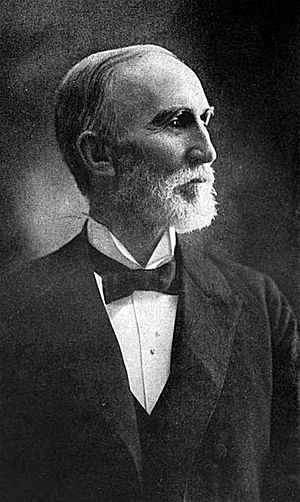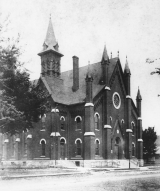Richard Cordley facts for kids
Quick facts for kids
Richard Cordley
|
|
|---|---|

Richard Cordley in 1903
|
|
| Born | September 6, 1829 |
| Died | July 11, 1904 (aged 74) |
| Alma mater | University of Michigan (B.A.) Andover Theological Seminary (M.A.) University of Kansas (D.D., hon. caus.) |
| Political party | Republican |
| Military career | |
| Nickname(s) | "The Abolition Preacher" "The Jayhawker Preacher" |
| Allegiance | United States of America |
| Service/ |
3rd Kansas Militia |
| Years of service | 1864-1865 |
| Rank | Private |
| Battles/wars | American Civil War Bleeding Kansas |
Richard Cordley (born September 6, 1829 – died July 11, 1904) was a Protestant minister. He was also an abolitionist, meaning he was against slavery. Cordley was connected with the Jayhawkers of Kansas. He is best known as the pastor of Plymouth Congregational Church in Lawrence, Kansas for many years.
Cordley was one of the first people to settle in Lawrence. He survived two major attacks on the town: the Sacking of Lawrence and the Lawrence Massacre in 1863. Later in his life, Cordley wrote books about the history of Lawrence and the state of Kansas. He also received the very first degree ever given by the University of Kansas.
Contents
Early Life and Education

Richard Cordley was born in Nottingham, England, on September 6, 1829. When he was four years old, his family moved to Livingston County, Michigan, in the United States. He started public school at age nine, but his mother had already taught him how to read.
Cordley went on to earn degrees from important universities. He received a Bachelor of Arts (B.A.) from the University of Michigan in 1854. Then, in 1857, he earned a Master of Arts (M.A.) from the Andover Theological Seminary. In 1874, the University of Kansas gave him an honorary Doctor of Divinity degree. This was a special award, and it was the first degree ever given by the University of Kansas!
A Pastor in Kansas
In 1857, Cordley became the pastor of Plymouth Congregational Church in Lawrence, Kansas. He stayed in this role until 1875. For a few years, he worked in Flint, Michigan, and Emporia, Kansas. But in 1884, he came back to Lawrence and became the pastor at Plymouth Congregational Church again. He continued serving there until he died on July 11, 1904. He was buried in Oak Hill Cemetery in Lawrence.
Supporting Education
Richard Cordley cared a lot about education. He played a big part in starting both the University of Kansas and Washburn University in nearby Topeka. In 1871, he was even asked to be the president of Washburn University, but he chose to stay in Lawrence instead.
Cordley also served on the state board of regents, which helps oversee universities. He was a very active member of the Lawrence School Board, helping to guide the local schools. He was the president of the school board from 1885 to 1891.
Beliefs and Actions
Cordley strongly believed in certain moral values. When he arrived in Lawrence, he worked to make the town a better place based on his beliefs. He wanted people to strictly follow the Sabbath (a day of rest and worship). He also strongly supported the end of slavery and was against the sale and use of alcohol.
Slavery was something Cordley deeply disliked. He helped establish the Plymouth Congregational Church partly to help and educate runaway slaves. During the time known as Bleeding Kansas, Cordley was called the "Abolition Preacher" because he was so strongly against slavery.
Cordley believed it was important to be loyal to God, family, and country. He often spoke about serving God in all parts of life.
Because Cordley was an abolitionist who supported the free state movement in Kansas, he was targeted during the Lawrence Massacre in 1863. This attack was led by pro-Confederate forces under William Quantrill. Cordley's home was burned down, but he survived. His church building also survived the attack. Quantrill later said he wished he had been able to kill the "Abolition Preacher." Cordley was important for writing down what happened during these early days in Kansas.
Commemorations
Cordley Elementary School in Lawrence, Kansas, is named after Richard Cordley to honor him.
Books by Richard Cordley
- The Lawrence Massacre (1865)
- A History of Lawrence, Kansas: From the Earliest Settlement to the Close of the Rebellion (1895)
- Pioneer Days in Kansas (1903)
- Sermons (1912)

